Mitt Romney talks about who might replace him — and what comes next
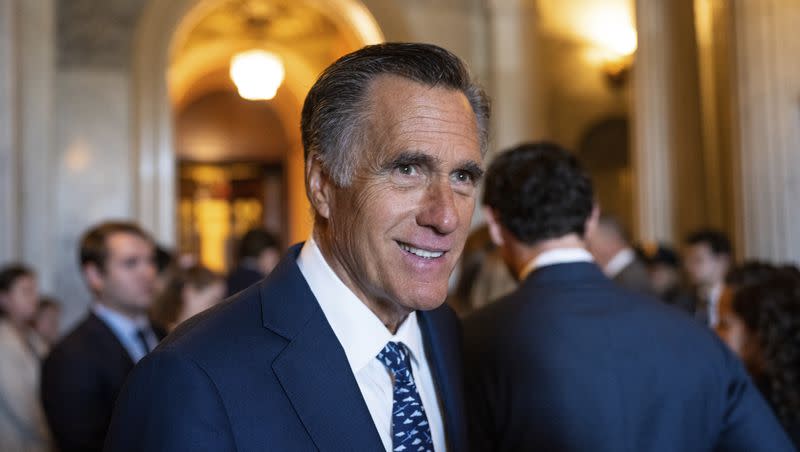
- Oops!Something went wrong.Please try again later.
- Oops!Something went wrong.Please try again later.
- Oops!Something went wrong.Please try again later.
- Oops!Something went wrong.Please try again later.
Sen. Mitt Romney announced he will not run for a second term on Wednesday.
He released a public statement that read in part, “While I’m not running for re-election, I’m not retiring from the fight. I’ll be your United States Senator until January 2025. … I will advance our state’s numerous priorities. I look forward to working with you and with folks across our state and nation in that endeavor.”
“It is a profound honor to serve Utah and the nation, and I thank you for giving me the opportunity to do so,” he said. In an interview with the Deseret News on Wednesday, Romney said he will be “watching to see who the people of Utah elect to become our senator, but we need the next generation to step forward.”
He said he has no plans to run for president: “You know, I wish people were clamoring for that to happen. That’s not going to happen.”
Romney says Biden, Trump don’t provide leadership on debt, immigration
Romney said he still has work to do during his remaining time in the Senate.
“I’m hoping that in the year and a half I have left that we’re going to be able to take on some of those issues, particularly as it relates to the deficit and debt and immigration,” he said.
But those issues require presidential leadership, he said.
“And we’re not seeing that either from President (Joe) Biden on those issues, or former president Trump. For instance, they both said that they won’t touch entitlements. Well, that’s where two-thirds of our spending is. So we’re not serious about the deficit if we’re not going to touch entitlements. On Ukraine, particularly Russia, and China, neither of them have really made the commitments that I think are necessary to lead there,” he said.
“I am concerned about presidential leadership and I just happen to believe that there are things that in order for them to get done in a divided political system, you need to have the president get on board and lead.”
Should other aging politicians step aside?
When asked if other aging politicians should follow his lead and step aside for younger candidates, Romney said not in all cases — but definitely Trump and Biden should.
“I wish President Trump and President Biden would we both get out of the way and let younger contenders vie for the support of the American people,” he said during a press conference with members of the Utah media. “I really wish that we could have the nominee of each party be someone who’s not a Baby Boomer.”
But in terms of whether other older members of Congress should retire, Romney had a more nuanced take.
“A decision like this has to be made on an individual basis. If you’re someone who is older, but you have extraordinary capacity to make things happen, because, let’s say, you’re the majority leader, or you’re the minority leader, or you’re the chairman of a key committee, why, you can still get things done. I think it’s a very different matter when you’re a very low tenure senator and getting long in the tooth,” he said.
On the future of the Republican Party
Romney said he “cares deeply” about the state and future of the Republican Party.
“I represent a minority wing of the party that cares about character, that cares about the debt, that cares about our role in the world and helping Ukraine defend itself,” he said. “I recognize that my wing of the party is small, but I believe it will come back and I will do what I can to help restore what I think is the ‘wise wing’ of the Republican Party.”
Could Romney win if he ran for a second term in 2024?
Romney said he was not bowing out over of concerns about his ability to win a Republican primary.
“The people of Utah may not agree with me on all the issues or how I voted on Donald Trump, but they do respect people who have integrity and vote their conscience,” he said. “I’ve been very pleased by the the results of the most recent polls and and there’s no question in my mind, were I to run again, I would win.”
Though conservative Republicans in Utah booed Romney in 2021 after his first impeachment vote against Trump, and some have suggested Romney would struggle in a Republican primary, a recent Deseret News/Hinckley Institute of Politics poll showed Romney ahead of potential Republican opponents. And the poll, fielded in August, found that, overall, 54% of Utahns still approve of Romney’s performance.
On who might replace him in the Senate
Romney said he does not plan to endorse anyone running to replace him.
“I don’t think I will endorse or get involved with any campaign,” he said. “There are a couple of people looking to run now. My guess is there may be others that decide to take a look at the race, but I’m not planning on getting involved with another campaign.”
Romney said he hopes “it’s a young person,” and a “person with a vision to actually do something that will help the country and help Utah.”
He also said he wants “someone who’s young, brilliant, committed, accomplished.”
“You know, I don’t have any names in mind. I know Brad Wilson, I respect him. He’s a good friend and he could certainly be a fine senator. I presume there are others who would also meet with my favorable mention. We’ll see who jumps into the race. But I don’t have any inclination to endorse anyone or to support a particular candidate.
“Our state is blessed with a lot of really good people, both in our state Senate and in the state House. We also have got some fine Congress people. I think Chris Stewart, were it not for the health matter in his family, he would probably be taking a close look at the race. John Curtis may take a look at it and and Blake Moore, Burgess Owens — I mean, we’ve got some very good people who well could serve you. I don’t think Governor Cox wants to leave the governorship — being a governor is more productive than being a senator. So I’m not expecting him to make the leap.”
Romney’s family supports his decision — but sons won’t follow in his footsteps, yet
When asked how his family felt about his decision not to run again, Romney said they were “entirely united” in their support for his decision.
“I typically follow the counsel of my wife Anne, and this is one more example of that,” he said.
When asked whether any of his five sons have plans to run for office, Romney said no — but left the door open to the possibility.
“I don’t think my sons have lost touch with common sense,” he said, jokingly. “I don’t know that any of them will run for office. It always depends on whether the window opens and whether there’s an opportunity and a need. You can never, in my opinion, accurately predict whether that will occur.”
My message to Utahns on my Senate reelection plan: pic.twitter.com/kgbsfIxMeR
— Senator Mitt Romney (@SenatorRomney) September 13, 2023
Romney’s 30 years in public service
Romney’s time in the Senate will cap 30 years of engagement in public service that began in 1994 when he first ran for Senate in Massachusetts against Democratic Sen. Ted Kennedy. Following his father George Romney’s footsteps into politics, Romney served as governor of Massachusetts, ran for president twice and helped turn around the scandal-ridden 2002 Salt Lake City Winter Olympics.
Related
In his five years in the Senate, Romney, 76, has played the role of senior statesman within the GOP, but has not shied away from criticizing his own party. His biggest legislative achievements — including taking a leadership role on the infrastructure bill and securing religious freedom protections in the Respect for Marriage Act — have come from working across the aisle with fellow moderates.
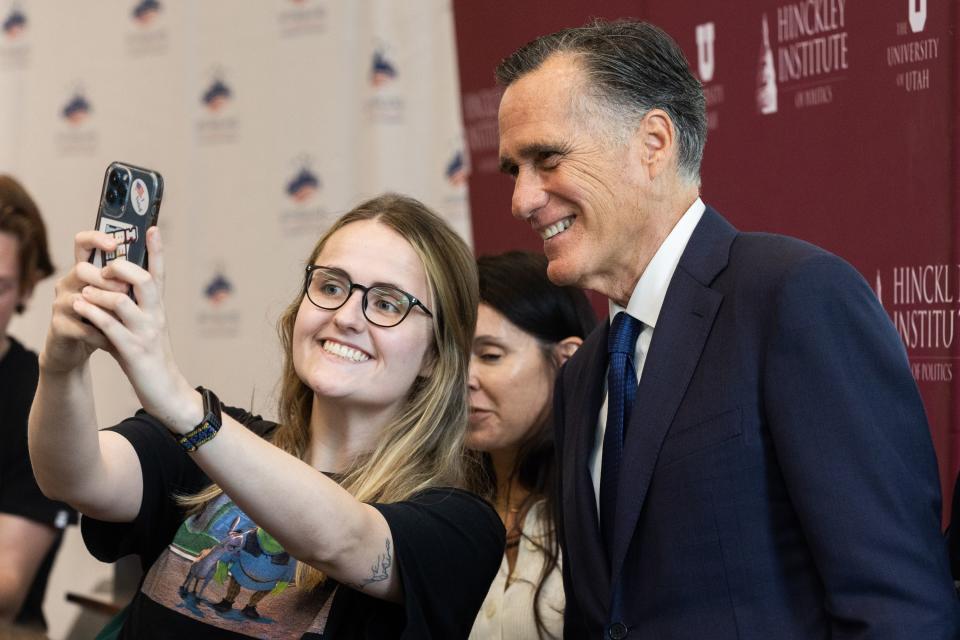
Speculation about Romney’s decision
For months, speculation has built around whether Romney would run for reelection. He told the Deseret News last month he would run only if he felt he could be “productive.”
“What I’m trying to do is to decide whether I can get some things done that I care about. In other terms, how productive can I be?” he said. “Because our state deserves someone who can actually get things done, work across the aisle if need be to accomplish things, and I’m getting a sense of whether that’s going to be something that I can do in another term.”
Romney’s time in the Senate has been marked on the one hand by consensus building and on the other with intraparty criticism of Trump, beginning with his famous 2016 speech at the Hinckley Institute of Politics at the University of Utah, in which he called Trump a “phony” and a “fraud.” In the Senate, he was the only Republican to vote to convict Trump after both his impeachment hearings.
But Jason Perry, director of the Hinckley Institute of Politics, said Romney was increasingly taking on the role of consensus builder within the GOP, as he’s worked to get bipartisan legislation passed.
“One of the unique aspects of Sen. Romney, whether voters support him or not, is that he has a platform that gets immediate attention nationwide. When he makes a comment, people talk about it, the press report on it, presidents respond to it. He has made himself relevant on the national stage,” Perry said.
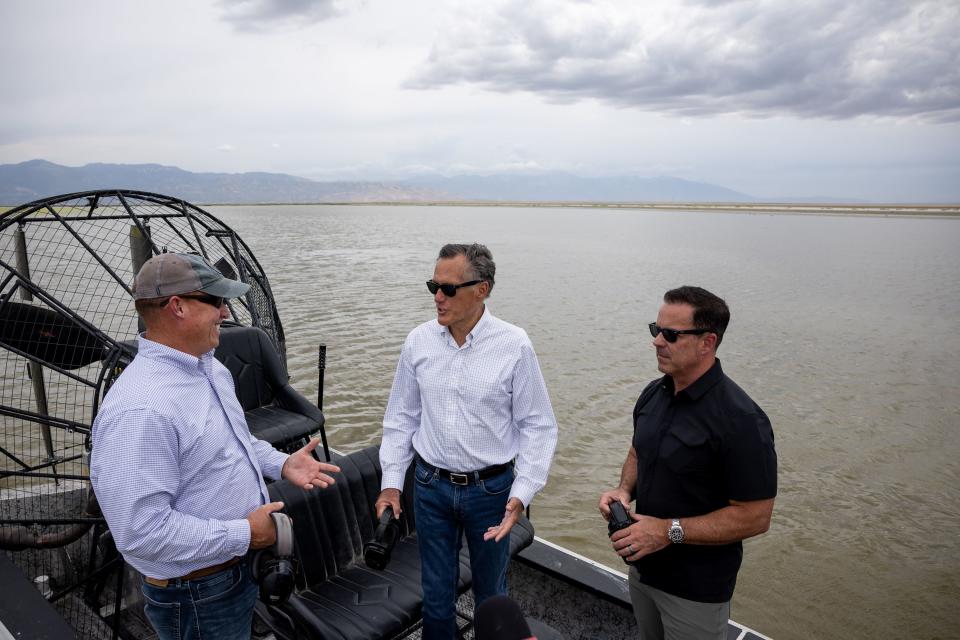
After losing to Kennedy in his 1994 race, Romney reentered the private sector, only to have local business leaders ask him to move to Utah to take the helm at the Salt Lake Organizing Committee.
Though initially hesitant, he would eventually take the role and spend three years in Salt Lake City, from 1999-2001, where he was widely credited for helping rescue the games.
Moving back to his home near Boston, Romney then ran for and won the governorship in Massachusetts, serving from 2003-2007. In 2008, he launched his first run for the presidency, eventually losing the Republican nomination to the late Sen. John McCain.
During his first run for president, after he received many questions about his membership in The Church of Jesus Christ of Latter-day Saints, he famously delivered a speech on the role of his faith in politics.
“Freedom requires religion just as religion requires freedom,” Romney said from the stage of the George H.W. Bush Library and Museum’s conference center in Texas.
Romney said he would not distance himself from his faith in order to get ahead politically.
“That I will not do. I believe in my Mormon faith, and I endeavor to live by it. My faith is the faith of my fathers — I will be true to them and to my beliefs,” he said.
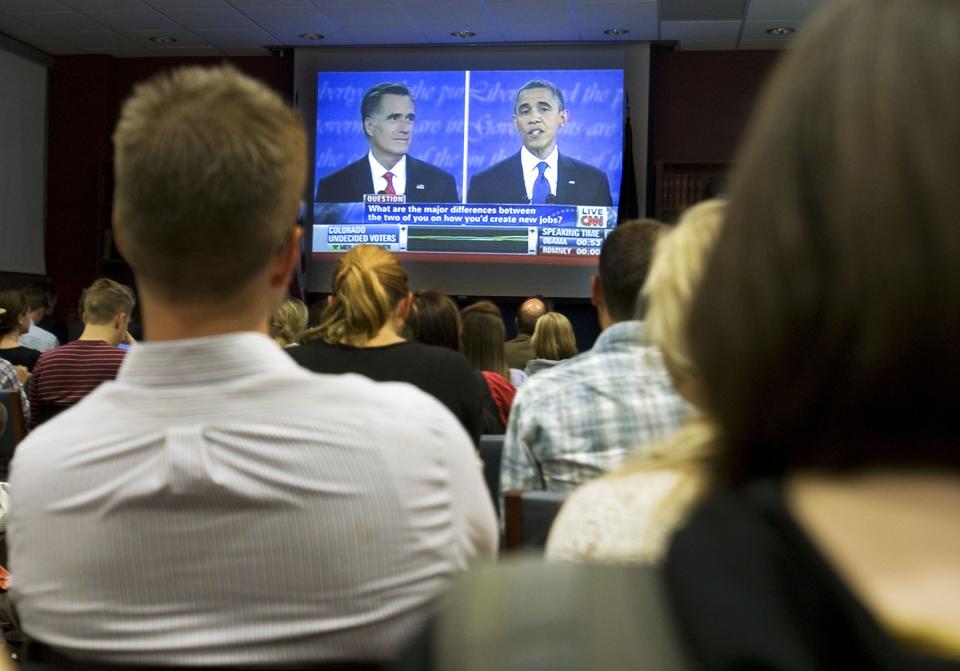
Mitt Romney’s presidential run and Senate service
He ran again in 2012, this time capturing the GOP nomination, although he eventually lost to former President Barack Obama.
Romney, along with his former running mate Paul Ryan, ran as traditional Republicans on a platform of small government, low taxes and social conservatism. Romney carried that same brand into his 2018 Senate run, even though the Republican Party had changed significantly after the election of Trump in 2016.
Romney has at times carved out a lonely road in the Senate, especially when he bucked his party to vote to impeach Trump twice.
The first time he voted to convict, in 2020, he was the first senator in American history to cross party lines to vote to impeach a president from his own party.
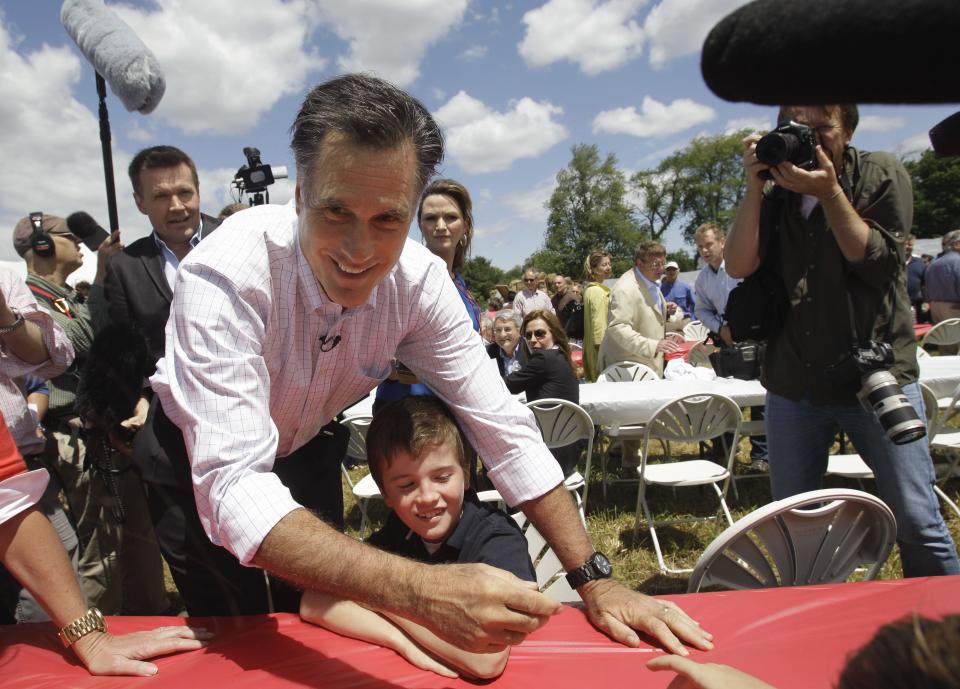
At the time, he spoke about his faith while explaining the reason for his vote on the Senate floor.
“As a senator juror, I swore an oath before God to exercise impartial justice. I am profoundly religious. My faith is at the heart of who I am,” Romney said, with emotion in his voice.
After a pause, Romney continued, “I take an oath before God as enormously consequential. I knew from the outset that being tasked with judging the president, the leader of my own party, would be the most difficult decision I have ever faced. I was not wrong.”
In the wake of the Jan. 6, 2021, riots at the Capitol, Romney voted to convict Trump a second time.
“The president’s conduct represented an unprecedented violation of his oath in office and of the public trust,” Romney said at the time of the second Trump impeachment. “The division in America will only begin to heal in the light of this truth, a truth which must now be affirmed by each of us in this chamber.”
Romney says he has work left to do
Romney said he still has unfinished business in the Senate.
When speaking to the Deseret News last month, Romney listed four things he’d like to focus on during his remaining time in office — the nation’s debt and reforming entitlements like Social Security and Medicare, two things that go hand-in-hand for Romney; developing a strategy to address China’s growing power in the world; climate change; and helping improve the nation’s social capital, or the ties that bind us together in families and as a society.
On Wednesday, he had narrowed his focus to immigration and the debt and deficit.
But he said he’s concerned about his ability to get things done in a Senate where many of the senators willing to work across the aisle might be moving on.
“The biggest concern I’ve had is that a group of about 10 of us that got a lot done over the last four and a half years, that group has kind of dissipated. Some have left the Senate. Others have gone on to other responsibilities, and that will probably have the biggest impact,” he said.
“You know, the funny thing about the Senate is they need every single senator to get something done. And so each senator is able to hold things up, or to make a difference in getting something passed. So I don’t worry about not being able to be effective in the time that I have, but I do think that it’s incumbent to get some folks in here, or a person in here, who will be here over the long haul, and can ultimately serve in leadership of a committee or leadership with the entire group.”
He struck a hopeful tone about the Senate caucus he will leave behind, and their ability to put moral leadership ahead of politics.
“I really do believe that character is destiny,” he said. “And I believe that most of my colleagues in the Senate feel the same way. I believe the overwhelming majority of the senators vote their conscience and I respect them in that regard. And I don’t know that I am any more of an exemplar in that regard than others. I do believe that’s at the heart of what has made our country the great success it is.”
What comes next for Romney?
By Wednesday afternoon, Romney said he’d already received a few offers for post-Senate work.
“I’ve had a couple of proposals sent to me today. I’m not going to be sitting on the beach,” he said at a press conference with Utah media.
“I’m too much a person of action to want to be relaxing for the rest of my life. So I will be actively involved in politics and probably trying to encourage my party to return to sanity,” he said.
Mitt Romney’s full statement
Romney’s full statement can be read here:
You know, I enjoy my work in the Senate a good deal. The last few years have been particularly productive, as I was able to help lead and negotiate the bipartisan infrastructure law, a comprehensive China strategy process, religious liberty protections, a compromise gun safety law, the Electoral Count Act reform and emergency COVID relief funding. I was also able to help secure key Utah priorities, including funding for Hill Air Force Base and its program to modernize our nuclear deterrent, as well as funding for wildfire prevention, water infrastructure, rural broadband, removal of uranium tailings from Moab, expansion and restoration of our highway and transit infrastructure, and federal studies to save the Great Salt Lake.
I have spent my last 25 years in public service of one kind or another. At the end of another term, I’d be in my mid-80s. Frankly, it’s time for a new generation of leaders. They’re the ones that need to make the decisions that will shape the world they will be living in.
We face critical challenges — mounting national debt, climate change, and the ambitious authoritarians of Russia and China. Neither President Biden nor former President Trump are leading their party to confront them. On the deficits and debt, both men refuse to address entitlements even though they represent two thirds of federal spending. Donald Trump calls global warming a hoax and President Biden offers feel-good solutions that will make no difference to the global climate. On China, President Biden underinvests in the military and President Trump underinvests in our alliances. Political motivations too often impede the solutions that these challenges demand. The next generation of leaders must take America to the next stage of global leadership.
While I’m not running for re-election, I’m not retiring from the fight. I’ll be your United States Senator until January 2025. I will keep working on these and other issues and I will advance our state’s numerous priorities. I look forward to working with you and with folks across our state and nation in that endeavor.
It is a profound honor to serve Utah and the nation, and I thank you for giving me the opportunity to do so.

